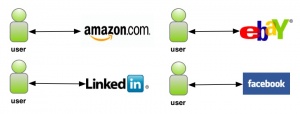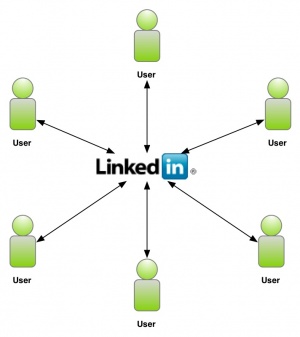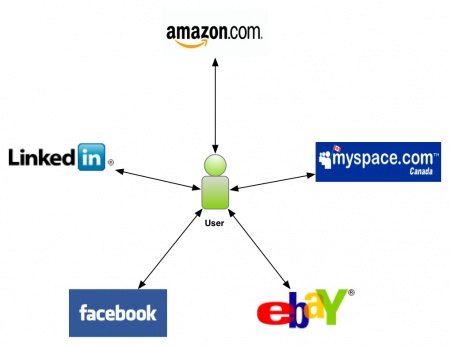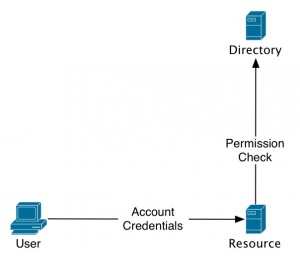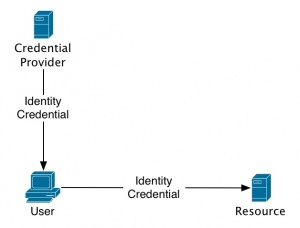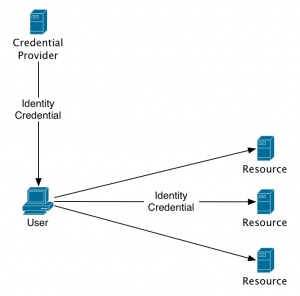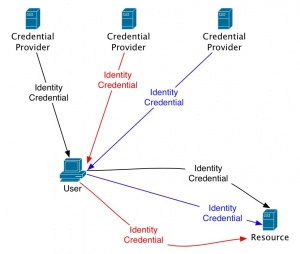Identity 2.0
From Computing and Software Wiki
(New page: = Identity 2.0 = '''Identity 2.0''' is the forthcoming revolution in online identity verification. The major shift from Identity 1.0 is the move from site-centric identity silos (figures ...) |
(→Identity 2.0) |
||
| Line 1: | Line 1: | ||
= Identity 2.0 = | = Identity 2.0 = | ||
'''Identity 2.0''' is the forthcoming revolution in online identity verification. | '''Identity 2.0''' is the forthcoming revolution in online identity verification. | ||
| - | + | __TOC__ | |
The major shift from Identity 1.0 is the move from site-centric identity silos (figures 1 and 2) to an open concept user-centric structure, where the user can move their identity from any site to any site (figure 3). | The major shift from Identity 1.0 is the move from site-centric identity silos (figures 1 and 2) to an open concept user-centric structure, where the user can move their identity from any site to any site (figure 3). | ||
| - | [[Image: | + | [[Image:site centric.jpg|thumb|300px|center|Figure 1: Identity 1.0 site-centric]] |
| + | [[Image:Site_centric2.jpg|thumb|300px|center|Figure 2: Identity 1.0 site-centric]] | ||
| + | [[Image:user_centric.jpg|thumb|450px|center|Figure 3: Identity 2.0 user-centric]] | ||
| - | |||
| + | ==Identity 1.0 Structure== | ||
| + | The current digital identity structure of the Internet follows an "opaque policy". People's identities are site-centric and is not shared across the sites. This is a hassle for users because they have to register at each site, filling-in the same info about themselves each time. | ||
| + | |||
| + | In addition to a less enjoyable user-experience, Identity 1.0 is also flawed in it's ability to scale efficiently. | ||
| + | |||
| + | [[Image:Identity10.jpg|thumb|300px|none|Figure 3: Identity 2.0 user-centric]] | ||
| + | |||
| + | ==Identity 2.0 Structure== | ||
| + | Identity 2.0 follows a transparent structure which closely mimics our real-world identification processes. | ||
| + | |||
| + | [[Image:Identity20.jpg|thumb|300px|none|Figure 3: Identity 2.0 user-centric]] | ||
| + | A major advantage with Identity 2.0 is its flexibility and ability to scale. This can be accomplished in the following two ways. | ||
| + | [[Image:Identity20a.jpg|thumb|300px|none|Figure 3: Identity 2.0 user-centric]] | ||
| + | [[Image:Identity20b.jpg|thumb|300px|none|Figure 3: Identity 2.0 user-centric]] | ||
| - | |||
| - | |||
| - | |||
| - | |||
==Future== | ==Future== | ||
| - | + | There are several companies and technologies looking to implement and direct the future of Identity 2.0. | |
| - | == | + | |
| - | + | [http://openid.net/ Open ID] | |
| + | |||
| + | [http://www.sxip.com/ Sxip Identity] | ||
| + | |||
| + | [http://www.oasis-open.org/committees/tc_home.php?wg_abbrev=security/ Oasis] | ||
| + | |||
| + | [http://en.wikipedia.org/wiki/Information_Card/ Information Cards] | ||
| + | |||
| + | [http://en.wikipedia.org/wiki/ Light-Weight_Identity/LID] | ||
| + | |||
| + | [http://get.live.com/ Windows Live ID] | ||
| + | |||
| + | [http://yadis.org/wiki/Main_Page/ Yadis] | ||
| + | |||
| + | |||
| + | ==References== | ||
| + | [http://en.wikipedia.org/wiki/Identity_2.0/ Identity 2.0] Wikipedia.org | ||
Revision as of 19:03, 5 April 2008
Identity 2.0
Identity 2.0 is the forthcoming revolution in online identity verification.
Contents |
The major shift from Identity 1.0 is the move from site-centric identity silos (figures 1 and 2) to an open concept user-centric structure, where the user can move their identity from any site to any site (figure 3).
Identity 1.0 Structure
The current digital identity structure of the Internet follows an "opaque policy". People's identities are site-centric and is not shared across the sites. This is a hassle for users because they have to register at each site, filling-in the same info about themselves each time.
In addition to a less enjoyable user-experience, Identity 1.0 is also flawed in it's ability to scale efficiently.
Identity 2.0 Structure
Identity 2.0 follows a transparent structure which closely mimics our real-world identification processes.
A major advantage with Identity 2.0 is its flexibility and ability to scale. This can be accomplished in the following two ways.
Future
There are several companies and technologies looking to implement and direct the future of Identity 2.0.
References
Identity 2.0 Wikipedia.org
